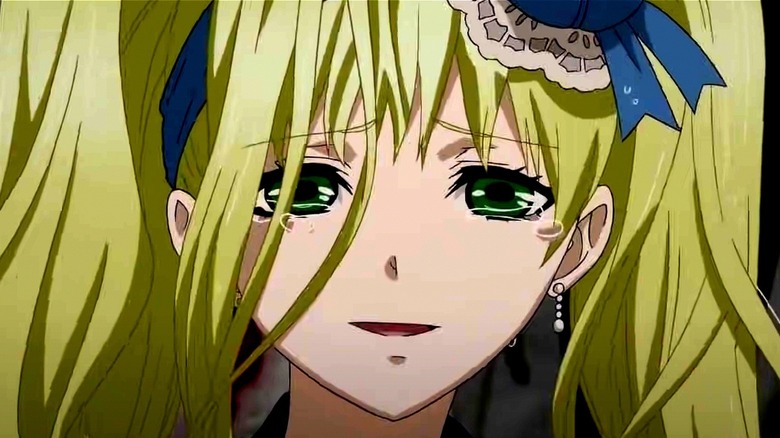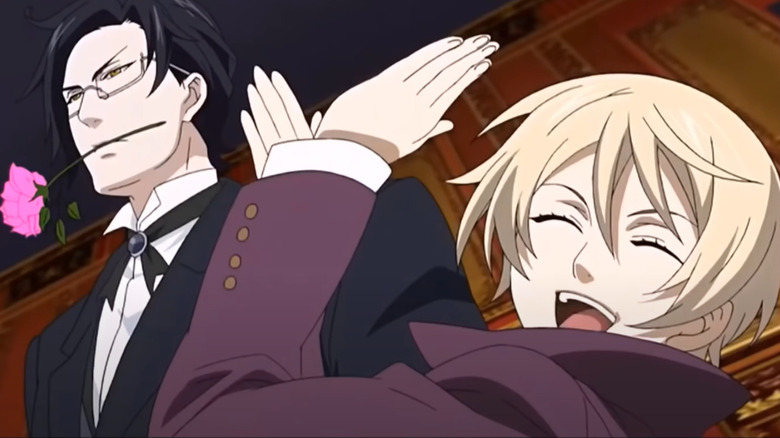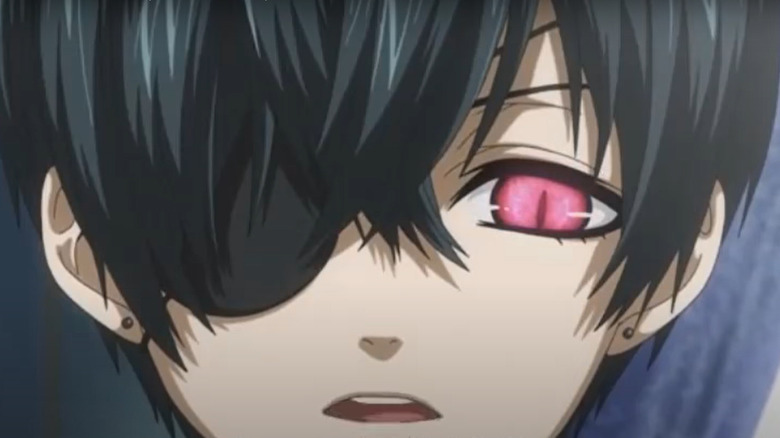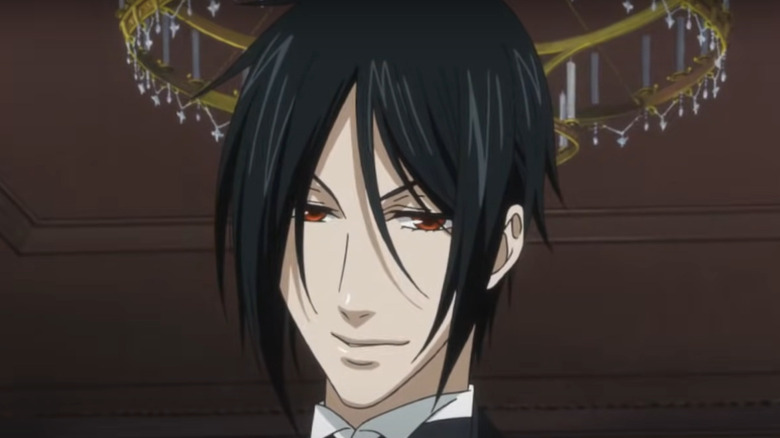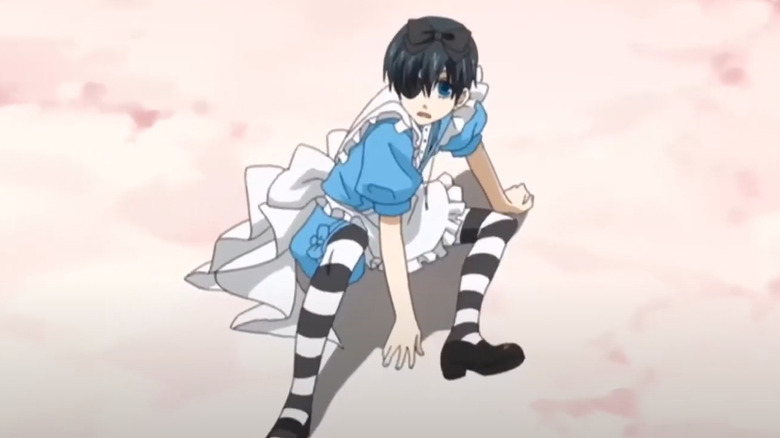The Ending Of Black Butler Season 2 Explained
"Black Butler" is an anime inspired by a manga, both of which follow Ciel Phantomhive, an orphaned heir to a massive fortune, and his butler, the quietly handsome Sebastian Michaelis, who just happens to be a demon contractually bound in servitude. In the first season, they investigated horrific crimes in the name of Queen Victoria, to whom they directly reported, and chased down the sociopathic angel who killed Ciel's parents. By achieving that very goal, Ciel's demonic contract with Sebastian — which was predicated on fulfilling the young lord's revenge in exchange for his immortal soul — was completed, and the season ended with the demon seemingly getting his payment.
Except the anime was more successful than the creators anticipated, and thereby a second season was ordered. Now, the series, which had already intentionally strayed from the source material, chose to double down on the new content, making "Black Butler" the anime a far sight different than "Black Butler" the manga (something which fans weren't necessarily happy about, per Comic Book Resources). In conjunction with the unexplained truth that a third of the second season is unrelated filler (more on that later), it can be potentially confusing to unravel what is important and what isn't. Here's a rundown of the second season's main storyline, how it ended, and what's truly "canon."
Alois Trancy and Claude Faustus are a not-so-subtle parody of Ciel and Sebastian
Season 2 of "Black Butler" features a new antagonistic pair of characters in Alois Trancy and Claude Faustus. Alois Trancy is the young, orphaned heir of a financially massive estate who works closely with his butler, Claude Faustus, who is a demon contractually bound to him in servitude. If that sounds familiar, it's supposed to ... because Alois and Claude are funhouse mirror parodies of Ciel Phantomhive and Sebastian Michaelis, (dis)respectively. For excruciatingly convoluted reasons best left forgotten, Alois ordered Claude to steal Ciel's soul before Sebastian could eat it because the second young, orphaned heir –- who's not really a young, orphaned heir, but rather a slave that traded up in life via a few bloody demon contracts –- has a vendetta against Ciel's demon.
And that's the setup which fills most of the season. The plots that Alois and Claude formulate to torment Sebastian (most of which include harming Ciel) are best described as a fever dream one might have about "Yu-Gi-Oh" in that everything feels made up on the spot, but the magical exposition behind it is clearly demented, for some ungodly reason. Ultimately, Claude realizes that Ciel's soul is worth more than Alois' soul and essentially abandons his contract with him, which causes the already convoluted story to cascade into a mess of new contracts and extra demons and hypnotism and mental labyrinth prisons and body snatching. Don't worry, it ends well. Sort of.
Ciel Phantomhive breaks canonicity by becoming a demon
As that mad lib of a sentence indicates, it's most important to know that Alois uses a new contract with a demon name Hannah Annafellows to bind Ciel's soul in a way that neither Sebastian nor Claude can obtain it. He does this by being inside Ciel's body at the time the contract was sealed (earlier, Claude killed Alois to prove his hunger for Ciel's soul and Hannah protected Alois' soul by turning herself, and others, into a magical suitcase for lost souls, it's a whole thing). Up to this point, Ciel has been something of a second wheel in his own series, having lost his soul between seasons. He also lost most of his memories and has been relying on Sebastian to carry him from plot point to plot point.
Unfortunately, what this all boils down to is that the ambitious young mind of Ciel Phantomhive is essentially useless in this arc. Even his greatest achievement of the season comes down to someone else's choices. After a ritual duel to the death inside a magic mind prison, Sebastian defeats Claude, thereby winning the right to Ciel's soul again, or so he thought. Just as the Black Butler goes to claim his prize, Hannah changes Ciel into a demon to fulfill her contract with Alois, which stated that neither of the demonic butlers should be able to devour Ciel's soul.
That change, which is completely different than anything that has ever occurred in the manga, has lasting consequences for everyone involved.
Sabastian Michaelis is literally imprisoned forever
Let it never be said that Sebastian Michaelis is a demon who breaks his word. Yes, there was that one time in the first season but he thought Ciel had already broken his word, so it's worth letting slide. And, while it's hard to feel particularly sorry for a demon who makes a habit of contractually consuming human souls, Sebastian is the one entity, outside of Ciel himself, who is most affected by the trickery of Alois and Hannah (neither of which are a problem anymore, as they're enjoying a weird soul siesta with Alois' dead, older brother and Claude, who is also very dead, it's a whole thing). Since Sebastian was under contract with Ciel to serve him until his soul was viable to be consumed and the young, orphaned heir is now an eternal demon, the poor butler is trapped serving him ... forever.
To his credit, Sebastian takes the situation rather well. In one of the final sequences of the second season's main story, it's shown that the two are going through the motions of humanity. As Sebastian serves Ciel an empty cup of tea, it becomes clear just how changed their dynamic is. The action is both proof of the older demon's continued servitude and his friendship, for whatever that concept is worth to a pair of demonic forces. The pair leave the Phantomhive estate behind, as well as Ciel's other servants, presumably to explore the world together.
It's somewhat implied that even though "Black Butler" the anime is drastically altered from its source material — even though the boy who's supposed to have a soul is now a demon — the relationship is similar enough for the creators to pursue further content.
OVAs don't matter unless they do
Even with the story wrapped up (for better or for worse), there are six episodes left in the season — these are the OVAs. OVA stands for Original Video Animation and that in itself has meaning but the takeaway for audiences is that OVAs are episodes, usually noncanonical, that studios use to fill out a season order. It's a fairly common practice in anime. The OVAs in "Black Butler" act as if the arc in the second season never happened. From there, literally, anything is possible.
For instance, two episodes are dedicated to an "Alice in Wonderland" theme, which is another oddly common practice in anime. One of these episodes acts as a pseudo-documentary, and others serve to give Grell, a recurring character who's a grim reaper with a crush on Sebastian, a little more screen time. Possibly the most interesting OVA follows Alois trying to make friends with a butterfly. That might not sound like much, but it really drives home how vicious the kid can be when he feels like he's going to be left alone. For canonicity, OVAs don't really matter. It's better to approach them as fun, extra content, otherwise, they leave a sour taste in the mouth, and only serve to further evidence how the second season of "Black Butler" was, in every possible way, a complete mess.
